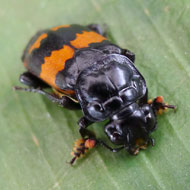
Burying beetles evolve larger body size with parental help
Co-operative behaviour in insect families affects how quickly their body size evolves, according to new research by the University of Cambridge.
Scientists studied burying beetles, which, unusually for insects, feed their offspring. For some experimental populations, only the largest beetles were selected, while others used only smaller beetles. Social conditions in families were also changed so that, in some populations, the parents helped their offspring, but in others, parents were removed and larvae had to help each other.
Lead author Benjamin Jarrett said: “We found that the social conditions made a big difference to how quickly beetle body size evolves over generations.”
Findings published in the journal Nature Ecology and Evolution suggests the beetles only evolve larger body size when their parents are present to feed them. Smaller size, on the other hand, evolved when parents were removed and there were too few larvae to help each other.
The study helps to explain how different species of burying beetle may have evolved their different sizes. Generally, larger species of beetle have more diligent parents than smaller species.
Burying beetles use the carcasses of dead animals such as mice or birds to raise their young. The carcass is shaved and buried, then the larvae feed on the carrion in addition to partially digested food that is regurgitated for them by their parents. Variable levels of parental care are seen in the species; occasionally larvae have to fend for themselves if they have been abandoned by their parents.
Senior author Professor Rebecca Kilner explained: “Previous work has focused on the puzzle of how cooperative behaviour evolves, because natural selection seems to favour animals that are selfish.
“We have shown that what happens next, in evolutionary terms, is just as interesting. Once cooperation has evolved, it can change the way in which evolution then unfolds.”
Image by gailhampshire/Flickr (CC BY 2.0)



 The Veterinary Medicines Directorate (VMD) is inviting applications from veterinary students to attend a one-week extramural studies (EMS) placement in July 2026.
The Veterinary Medicines Directorate (VMD) is inviting applications from veterinary students to attend a one-week extramural studies (EMS) placement in July 2026.